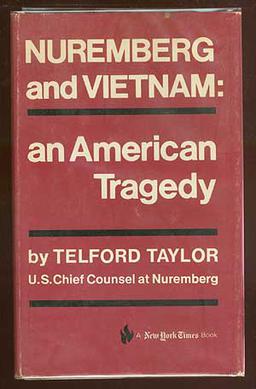Nuremberg and Vietnam facts for kids
 |
|
| Author | Telford Taylor |
|---|---|
| Language | English |
| Publisher | Quadrangle |
|
Publication date
|
June 1970 |
| Media type | Hardcover Paperback |
| Pages | 224 pages |
| ISBN | 0-8129-0210-6 |
Nuremberg and Vietnam: An American Tragedy is a book by Telford Taylor. He was a main lawyer, called the Chief Counsel Prosecutor, at the famous Nuremberg Trials. These trials judged Nazi leaders after World War II.
Contents
Understanding the Book's Purpose
The book Nuremberg and Vietnam: An American Tragedy came out in 1970. It looks closely at how the United States fought the Vietnam War. The author compares these actions to what Nazi Germany did during World War II.
Telford Taylor was a key figure at the Nuremberg Trials in Germany. These trials happened from 1946 to 1949. During this time, Taylor helped create the rules for trying Nazi leaders. These rules were for their serious crimes during the war.
Exploring War Laws and History
The book starts by explaining the history of war crimes. It goes back to the "knightly chivalry" of the Middle Ages. Even then, there were ideas about fair fighting. These early rules aimed to reduce needless cruelty in wars. They also tried to protect regular people and stop the spread of sickness.
Over time, these rules became more formal. In 1863, U.S. President Abraham Lincoln approved the "Lieber Code." This document had 159 articles. It covered rules for spies, prisoners of war, and punishing war crimes. This code helped lead to international laws for warfare.
Later, international laws of war were written down in treaties. These included the Hague and Geneva conventions. A very important result of these treaties was that all nations had to follow these international war laws. This was true whether they signed the treaties or not.
Nuremberg Trials and Their Impact
The Nuremberg Trials were very important for international law. Telford Taylor played a big part in them. First, these trials allowed war crimes to be judged by international courts. Second, they made individuals in war follow international laws. These laws were even more important than their own army's rules.
For Taylor's book, the most important outcome was this: The United States became bound by the rules from Nuremberg. This meant the U.S. had a legal and moral duty to follow these principles. So, Taylor wondered how these Nuremberg rules applied to the U.S. actions in the Vietnam War.
Comparing Vietnam to Nuremberg Principles
When Nuremberg and Vietnam was published, people often used the Nuremberg trials to support their views on the Vietnam War. Some people said the U.S. was right to be involved. They argued that North Vietnam attacked South Vietnam. This was against the United Nations Charter. They felt South Vietnam could defend itself, and the U.S. could help.
However, others felt that U.S. actions in Vietnam might be "aggressive warfare." This was based on the Nuremberg standards. Taylor pointed out that "aggressive warfare" was hard to define. This made it tough to say who was the "aggressor" in Vietnam. Such unclear definitions also raised questions about refusing to serve in the war. Many people refused to fight because they felt the war was illegal. They worried that fighting in it would make them guilty of "crimes against humanity."
Taylor also looked at possible war crimes like the My Lai Massacre of 1968. This part of the book compares Nuremberg to Vietnam the most. Taylor shares two eyewitness stories. One is from a German engineer describing the killing of Jews during the Holocaust in 1942. The other is an eyewitness account of the My Lai Massacre. Taylor shows how these stories are similar. But he also explains their differences. He shows how hard it is to decide if the U.S. committed crimes.
Taylor also discussed problems within the U.S. government regarding the Vietnam War. He questioned whether the United States Congress or the President was truly in charge of declaring war. Taylor believed both the President and Congress shared responsibility. He thought the war could only end if the nation truly wanted it to, not just through legal decisions.
Book's Main Message
Nuremberg and Vietnam: An American Tragedy explains the Vietnam War through the lens of international law. It was written by an expert on the topic. The book is not meant to accuse anyone. Instead, it explores the possible challenges the United States faced because of its involvement in the Vietnam War. By using the Nuremberg Trials as a comparison, Taylor showed his concerns about the Vietnam War.
More Books by the Author
- Anatomy of the Nuremberg Trials: A Personal Memoir, Knopf 1992; ISBN: 0-394-58355-8
- Breaking Wave, Nautical & Aviation Publication Corporation of America 1991; ISBN: 0-933852-95-9
- Courts of terror: Soviet criminal justice and Jewish emigration , Knopf 1976; ISBN: 0-394-71758-9
- Grand Inquest: The Story of Congressional Investigations, Da Capo PR 1974; ISBN: 0-306-70620-2
- Munich: The Price of Peace, Random House Inc 1980; ISBN: 0-394-74482-9
- Perspectives on Justice, Northwestern University Press 1974; ISBN: 0-8101-0453-9
- Sword and Swastika: Generals and Nazis in the Third Reich, Peter Smith Publisher 1980; ISBN: 0-8446-0934-X
- Two Studies in Constitutional Interpretations, Ohio State University Press 1969; ISBN: 0-8142-0122-9
 | William Lucy |
 | Charles Hayes |
 | Cleveland Robinson |

